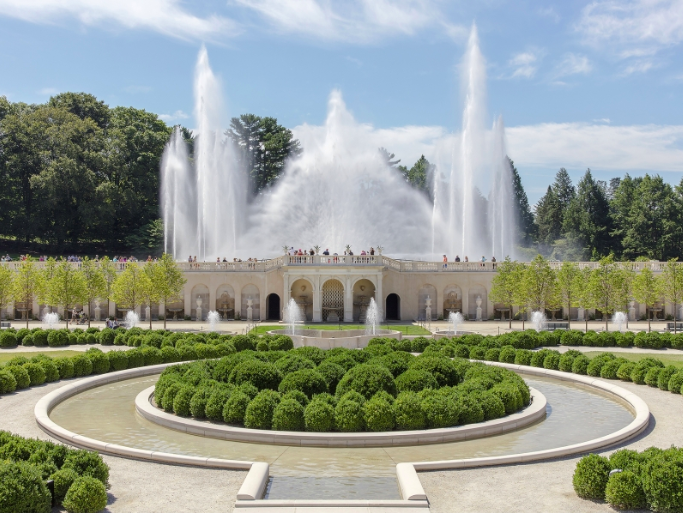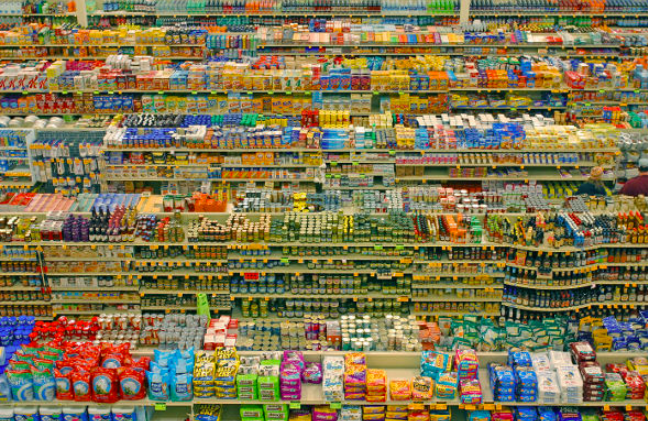What We See and What We Know (Or, Why We Need to Question Overabundance)
by Kate Parker | February 18, 2020

Last August, as my mother and I were barreling south down Highway I-81 through Pennsylvania, I suggested we take the exit to visit Longwood Gardens, a magnificent 1,077 acre park for horticultural enthusiasts. The largesse and grandeur of the Gardens began with founder Pierre du Pont’s great-great-grandfather and namesake, a French-American economist who believed that land existed for the sake of the aristocracy and their estates.
No wonder, then, that Longwood Gardens is practically a palace. Awe-inspiring fountains lined with European marble sparkle around every bend. Its paths resemble le Parc Georges Brassens in Paris, and there’s even an Italian-inspired grotto to cool down in. Once inside the Gardens, it’s very easy to forget about the small towns and the bustling interstate just beyond the hedgerow.
Beneath the surface of all those winding paths and enormous fountains lies a labyrinth of hidden pipes for pumping thousands of gallons of water per minute. According to the short film in the visitors’ center, the fountains represent DuPont’s main passion while he was alive: scientific progress. When, before, were men able to make such precise art out of something so fleeting as water? When I consider how fundamental this grand design of piping and tunneling is to the gardens, it's curious to me how out of sight it all is. If the gardens constitute a kind of Eden, then it is a decidedly manufactured one.
* * *
When I was farming, I always enjoyed seeing how our bodies told the stories of what we had harvested to eat. Picking squash left tiny cuts and a shallow rash on my inner forearms. Cutting mint for a long time burned my hands and stained them light brown. Harvesting tomatoes blackened my skin and turned my arm hairs neon green. There was little distinction between my body and its work, and this, more than anything I’ve ever experienced, helped me find belonging.
My callouses grew upon long lines of tomato twine. My muscles learned the weight of the earth. My freckles came and went with the summer vines. As I worked under the sun, my warm body wrung countless drops from the humid air and mixed them with her salt. The westerly winds wrung more water from the clouds every afternoon. And always while I slept, Night extracted the rest into cool, dark morning dew. The work made me feel small, but it also taught me that there was something more beautiful and important than myself, and that I was a part of it.
"The work made me feel small, but it also taught me that there was something more beautiful and important than myself, and that I was a part of it."
* * *

Last week, I was shopping for tomatoes at the supermarket, because it’s January, and, determined as I am to be a good cook, I wanted to practice a tomatoey-shrimp recipe on my housemates. It’s amazing how we take for granted the loads of tomatoes we see lined up on the supermarket shelves in winter. I began to wonder where all those tomatoes came from and how they were harvested.
Who were the workers, and were they were paid enough? Did their backs hurt? How long did they spend every day stooped in the bushes with their tomato buckets? Did their sweat fall back to the earth, like my sweat had? Or did their sweat fall into what appeared to be soil, but was really just an assembly line? I shook my head, put one mealy tomato into my basket, and made my way past a dozen aisles of corn and sugar to the frozen foods section.
Bags of shrimp were on sale. The packaging assured me that they were chemical free, and that the whole arrangement would save me lots of time, and lots of money. I then remembered a conversation I’d had many years ago with a girl who grew up near the border of France and Germany. We were eating stale saltine crackers at a linoleum table in the student health clinic. The salt from our saltines kept falling onto the thin carpeting. I asked her what the biggest difference was between where she grew up and the United States. She told me she missed the smells; when she came to the United States, there were no more smells, she said. She said she missed the smell of fish and salt in the air.
I wondered what the bagged shrimp smelled like. I wondered where they were produced and what it smelled like there. Was our shrimp still being harvested by slave labor somewhere in Indonesia? Did the shrimp in the bag come from one of their nets? Did the salt and the seawater end up in the bag, too, or had it all been washed down a factory drain? By children? Mothers? Who has been speaking up for their tired tears? Who is there to prove my assumptions wrong?
I felt overwhelmed. At what point does more plentitude and convenience deliver diminishing returns on power? I had a feeling that many of my choices had already been made for me somewhere out of sight, and somewhere very far away from that brightly lit aisle where I stood alone, rather cold and very confused.
"I had a feeling that many of my choices had already been made for me somewhere out of sight, and somewhere very far away from that brightly lit aisle where I stood alone, rather cold and very confused."
* * *
In some ways, Longwood Gardens is not so different than your local supermarket. In both cases, an abundance has been produced that is very different from what we would find in nature. Both the supermarket and the gardens are highly ordered and predetermined—not by nature—but by modern constructions of power and conceptions of the good. When we go to the supermarket, we ought to be aware that the prices are so low because the modern food system’s costs to the environment and human health have mostly been externalized by powerful corporations and agricultural lobbies. But these realities are conveniently hidden away behind countless images, labels, and advertisements, so that all you have to do is admire the colors, believe what they tell you, and spend your money.

The museumification of our lives is something I am trying to resist, but it’s a powerful force. Sometimes it makes me feel like a gasping projectile—a mere molecule funneled through hidden networks of political piping. If you look around the supermarket and ask, “how was this all made possible?” you might feel like a bug trapped in a web. I believe that we’re more limited than our culture of individualism would have us believe. We need to belong, and the more we distance ourselves from the earth and from our neighbors, the more we must accept the widening gap between what we see, and what we really know.
Here’s a tragic irony: Even though Pierre du Pont took great pride in his ability to control and conduct the flow of water with his fountains, the company he left behind, DuPont chemical company, still polluted our waterways with toxic PFOA and PFAS chemicals that we still can’t figure out how to clean up. As a result, our drinking water—and our very blood—have been forever polluted. And now I wonder if, on our trip to Longwood Gardens, my mother and I weren’t misted with some of DuPont’s chemicals when we walked beneath those fountains.
Our bodies ought to be treated as sacred, but we can’t protect our bodies when we place ourselves in systems that distance us from the decisions being made. I don’t want to be a gasping projectile—I want to latch down into the earth, and I want to live an embodied life.
In her essay, “Uses of the Erotic: The Erotic as Power,” Audre Lorde makes the distinction between living an erotic life and a sensory life, and I think that this distinction is often a matter of proximity. It’s about knowing more about a garden than what it looks like, and more about our food than what can be printed on a label. Audre’s erotic asks us to consider how we live in work and leisure. It helps me to ask: “How do we grow our food, and how do we share it with others? How does it all smell, what does it look like on our bodies, and how do we let it nourish our communities?”
Toward the end of our visit to the Gardens, I remember walking through a pretty greenhouse full of ornamental chard, cabbages, and beets. The signs told us not to touch. But I don’t think I can look at chard and not imagine the hours I spent cracking its stem at the roots, gathering its leaves together and measuring its bulk against the size of my hand, slipping a knife across its ends and bundling it with a rubber band. In Pierre’s garden, I suppose that kind of work isn’t necessary. But, really—a room of vegetables to only ever be looked at?? I ignored the signs and reached my hands out anyway.
Kate Parker grew up in Round Hill, Virginia, and spent most of her childhood working in the dirt or romping through fields and riversides with friends. She has spent many of her summers farming with Potomac Vegetable Farms, and she likes to paint portraits of friends and write music whenever she can. She is currently finishing up school at the University of Virginia and hopes to use her degree in Political Philosophy, Policy, and Law to advocate for rural communities and sustainable farming practices.

